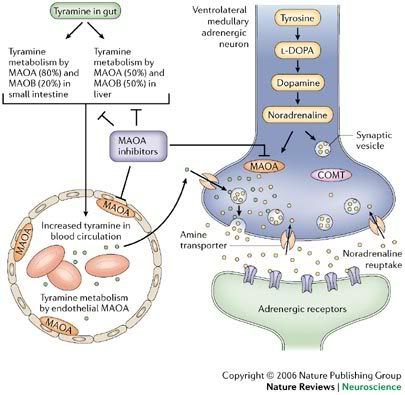Hi,
Since most here take stacks consisting of maybe dozens of supplement, I thought it might be uselful review some possible interactions . Because we don't really know all that well what these substance do in the body, we should start with some common interactions, like neurotransmitter activity or liver metabolism.
I actually got interested in the subject when I realized resveratrol, green tea and Rhodiola are all possible MAO-inhibitors. Obviously extensive MAO-inhibition has problems in and on itself (tyramine foods, serotonin syndrome etc.) but also interacting with other sbstances, for example melatonin appears to be contraindicted with MAO Inhibitors (because MAOs metabolize melatonin). I bet many here take large amounts of resveratrol, green tea and Rhodiola and melatonin everyday. Even if we are not going to do anything to avoid the possible interaction, I think it still would be good to at least be aware of it.
The liver enzymes interactions are a real pain in the ass to go through, has anyone ever tried make some analysis on that one?
Resveratrol and MAOs
1: Biochem Biophys Res Commun. 2006 Jun 2;344(2):688-95. Epub 2006 Apr 17.Click here to read Links
Inhibitory effects of cis- and trans-resveratrol on noradrenaline and 5-hydroxytryptamine uptake and on monoamine oxidase activity.
* Yanez M,
* Fraiz N,
* Cano E,
* Orallo F.
Departamento de Farmacologia, Facultad de Farmacia, Universidad de Santiago de Compostela, Santiago de Compostela (La Coruna), Spain.
This study investigated for the first time the potential effects of cis- and trans-resveratrol (c-RESV and t-RESV) on noradrenaline (NA) and 5-hydroxytryptamine (5-HT) uptake by synaptosomes from rat brain, on 5-HT uptake by human platelets, and on monoamine oxidase (MAO) isoform activity. Both c-RESV and t-RESV (5-200 microM) concentration-dependently inhibited the uptake of [3H]NA and [3H]5-HT by synaptosomes from rat brain and the uptake of [3H]5-HT by human platelets. In both experimental models, t-RESV was slightly more efficient than c-RESV. Furthermore, in synaptosomes from rat brain, the RESV isomers were less selective against [3H]5-HT uptake than the reference drug fluoxetine (0.1-30 microM). On the other hand, both c-RESV and t-RESV (5-200 microM) concentration-dependently inhibited the enzymatic activity of commercial (human recombinant) MAO isoform (MAO-A and MAO-B) activity, c-RESV being slightly less effective than t-RESV. In addition, both RESV isomers were slight but significantly more selective against MAO-A than against MAO-B. Since the principal groups of drugs used in the treatment of depressive disorders are NA/5-HT uptake or MAO inhibitors, under the assumption that the RESV isomers exhibit a similar behaviour in humans in vivo, our results suggest that these natural polyphenols may be of value as structural templates for the design and development of new antidepressant drugs with two important biochemical activities combined in the same chemical structure: NA/5-HT uptake and MAO inhibitory activity.
PMID: 16631124 [PubMed - indexed for MEDLINE]
Green tea and MAOs
Indian J Exp Biol. 2006 Nov;44(11):913-7. Links
Green tea [Camellia sinensis (L.) O. Kuntze] extract reverses the despair behaviour in reserpinised and diabetic mice.
* Singal A,
* Tirkey N,
* Muragundla A,
* Chopra K.
Pharmacology Division, University Institute of Pharmaceutical Sciences, Panjab University, Chandigarh 160 014, India.
Green tea (C. sinensis) extract (GTE) dose dependently produced reversal of despair in normal, reserpinised and diabetic mice, thereby demonstrating an antidepressant effect. Although the exact mechanism is yet to be explored, the possible inhibition of catechol-o-methyl transferase and monoamine oxidase enzymes may be responsible for antidepressant activity of GTE.
PMID: 17205714 [PubMed - in process]
Rhodiola and MAOs
http://www.imminst.o...=post&id=149269
Extracts of R. rosea have been reported to influence
the levels and activities of biogenic monoamines, such
as serotonin, dopamine and norepinephrine, in the
cerebral cortex, brain stem and hypothalamus (Kurkin
and Zapesochnaya, 1986). It is believed that these
changes in monoamine levels are due to inhibition of
the activities of the enzymes responsible for monoamine
degradation (monoamine oxidase and catechol-Omethyltransferase),
and to facilitation of neurotransmitter
transport within the brain (Stancheva and
Mosharrof, 1987). Therefore we can postulate that
this antidepressant-like activity of RHO depends on
its ability to enhance the catecholaminergic system
(Burchfield, 1979; Lishmanov et al., 1987; Saratikov and
Krasnov, 2004; Panossian and Wagner, 2005).















































